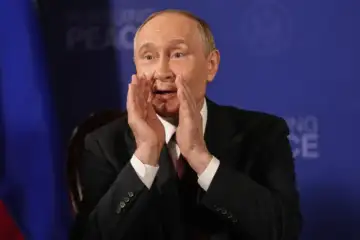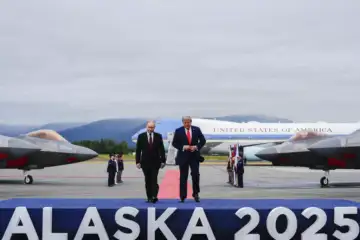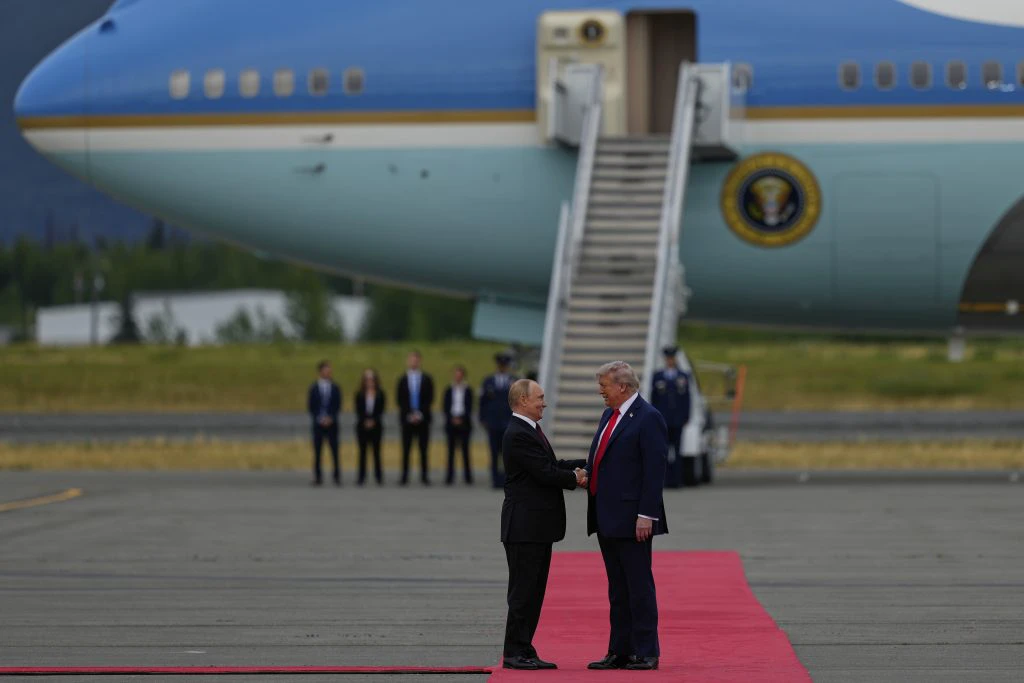It was billed as a potential turning point after more than three years of Russia’s continuing invasion of Ukraine. .one under an International Criminal Court arrest warrant for war crimes, the other a sitting US leader seeking a second term.
The optics were jarring; the outcomes even more so.
Vladimir Putin left the stage in Alaska with visible confidence, buoyed by the simple fact of being there. As former US ambassador to NATO Douglas Lute told the BBC: “Putin comes away with the end of international isolation. He’s seen as a big man on the big stage with the US president: warm welcome, red carpet, riding Trump’s car, standing in front of a sign that said ‘pursuing peace’ – which is anything but what Vladimir Putin is all about.”
As Trump greeted Putin on the red carpet, calling him by his first name – “Vladimir” – a
cut through the choreographed moment: “Mr Putin, did you underestimate Ukraine?” Putin, expressionless, stood for photographs with Trump. The same reporter pressed again: “President Putin, will you stop killing civilians?” This time, Putin raised his hands to his ears in a pantomime of not being able to hear. That early exchange, before the two men even entered the building, might as well have been the summit’s closing scene.
For Trump, however, the ledger was empty. “In return what did Trump get? Zero… We accomplished very little,” Lute added. There was no ceasefire, no roadmap, no substantive agreement. It was a meeting that left Trump visibly deflated, less talkative than during his usual sprawling press encounters. The spectacle was Putin’s to bank.
Before the meeting, Trump had sounded confident. He told Fox News host Bret Baier,”I think it’s going to work out very well. And if it doesn’t, I’m gonna head back home real fast.” In the end, there was no rushing home. As Putin departed Alaska, Trump returned to the very room where the bilateral had taken place hours earlier, to tape an interview with Fox News anchor Sean Hannity.

Russia’s President Vladimir Putin speaks as he meets with President Donald Trump Friday, Aug. 15, 2025, at Joint Base Elmendorf-Richardson, Alaska. Photo: AP/PTI.
In that interview, Trump claimed there had been “one big thing” blocking a deal, but declined to say what it was. “I think he wants to see it done,” he said of Putin, offering no detail on the sticking point. He went on to praise the Russian leader for agreeing that, had Trump been president at the time of the invasion, “the war would have never happened.”
“This war should have never have happened,” Trump told Hannity. “You know a lot of wars should have never had happened. Stupid things go down and wrong people are talking.” He then blamed former president Joe Biden for failing to prevent the invasion.
If the event lacked the weight of Yalta, where Allied leaders shaped the post-war world, and the perilous drama of Munich, where appeasement emboldened an aggressor Nazi Germany, it nonetheless carried implications. Kyiv may breathe easier that no territorial concessions were announced, but that relief is tempered by the reality that the very invader they had sought to isolate for years received a red-carpet welcome. Even had a deal been unveiled in Anchorage, few in Ukraine would have trusted it.
Trump, in his interview with Fox News, appeared to acknowledge that any agreement was far from secured. Asked whether a deal had been reached, he called it “still pending.””Well, they have to accept them,” he said, describing the talks as a “very warm meeting” and insisting “we’re pretty close to a deal.” But he was clear that Ukraine would need to agree to the terms and that “maybe they’ll say no.”

President Donald Trump and Russia’s President Vladimir Putin talk, Friday, Aug. 15, 2025, at Joint Base Elmendorf-Richardson, Alaska. Photo: AP/PTI.
Then came what sounded less like diplomatic caution and more like a public prod: “Make a deal,” he urged President Volodymyr Zelensky. For many Ukrainians, that phrase will register less as encouragement and more as an unsettling reminder that the discussion about their country’s future remains, in part, a conversation between others.
More troubling were Putin’s words about the “root causes” of the war – Kremlin shorthand for his longstanding objective of dismantling Ukraine’s sovereignty. The absence of tangible progress leaves open the question of what happens next. Russia’s strikes on Ukrainian cities have continued unabated, and Western ultimatums – including Trump’s own in recent months – have dissolved into little more than rhetorical dust. For Ukrainians, Anchorage may read as another signal that the attacks will go on without consequence.
What happened in Alaska was not diplomacy, nor even failed diplomacy. It was the political equivalent of a bad date. One man wanted to get out of the cold, and he did. The other seemed so eager for the meeting that rejection looked almost inevitable. Putin left with a grin; Trump left without his “big, beautiful” ceasefire. And the war in Ukraine goes on.
